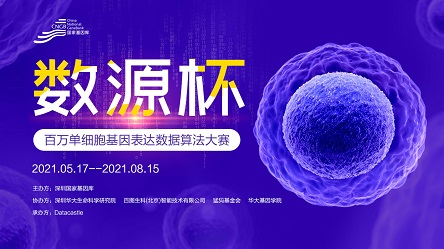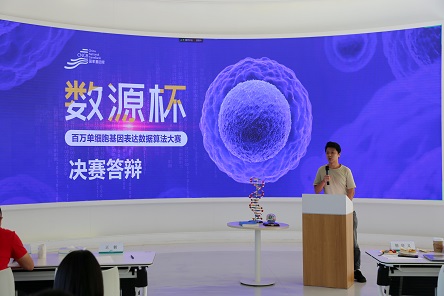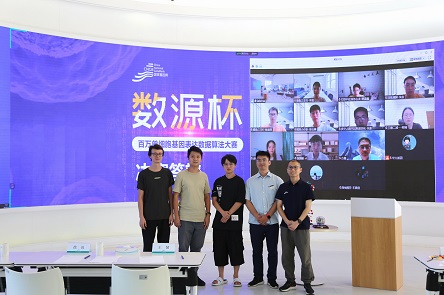
The "Digital Source Cu" Million Single-Cell Gene Expression Data Algorithm Contest was officially opened on May 17 to encourage researchers and practitioners in related fields to develop and optimize single-cell clustering algorithms based on the millions of single-cell data resources stored in the National Gene Bank's Big Data Platform, which is an important step in single-cell data analysis. At the same time, the contest provides a platform for cross-disciplinary technical exchange among professionals in life sciences, medicine, computer science, and other fields. The contest attracted the participation of professionals and technicians from more than 100 well-known universities and nearly 90 enterprises and institutions at home and abroad, including Peking University, Tsinghua University, Boston University, Children's Hospital of Philadelphia, Institute of Computing, Chinese Academy of Sciences, Huawei, Tencent, Baidu, Ping An Technology and so on. A total of 1819 works were submitted.

"Digital Source Cup" Million Single Cell Gene Expression Data Algorithm Contest: This contest aims to
improve the performance of single-cell clustering algorithms, requiring participants to
develop/optimize single-cell clustering algorithms to reduce memory and increase computing speed while
ensuring the accuracy of analysis results using data resources provided by the organizer.
Single-cell
transcriptome sequencing (scRNA-seq) has become a core tool for identifying and characterizing cell
types, states, lineages, and networks. Cell clustering is a common step in the analysis of single-cell
data. The goal of clustering analysis is to retain the major sources of variation in the dataset of
the cell type to be defined while trying to shield variation due to useless sources of variation
(sequencing depth, cell cycle differences, mitochondrial expression, batch effects, etc.). Several
well-established single-cell clustering algorithms exist, such as classical hierarchical clustering
and K-means, as well as SC3 clustering developed specifically for single-cell technology. However, as
single-cell data continues to be produced, the throughput of data processing will continue to climb,
so the performance of single-cell clustering algorithms needs to be continuously improved.

1. Participants are required to complete the formation of teams (maximum 5 persons per team) and
register and submit materials for each phase of the contest as a team. One participant is allowed to
participate in only one team.
2. Teams will download the data resources from the contest
platform, complete the algorithm optimization locally, and submit the work in each phase on time
according to the contest schedule. The work includes analysis results, algorithm source code, and
related documents (data pre-processing documents, algorithm model documents, algorithm operation
(environment) documents), including team introduction materials for the preliminary round and defense
materials (PPT) for the final round.
3. the contest invites a panel of experts in the field of
single-cell and big data to conduct code evaluation and comprehensive evaluation of the works in each
session.* Preliminary round can register, watch training videos, and
interact with the expert panel online.
First Prize: 1 team, RMB 20,000
Second Prize: 2 teams, RMB 10,000
Third Prize: 3 teams, RMB
3,000
Fourth prize: 4 teams, RMB 1,000
| Rank | Team Name | Institution |
|---|---|---|
| First Prize | How can I go without the fielding (Jiaxin Liu) | Huazhong University of Science and Technology |
| Second Prize | FakeDr (Zheng Cao) | Zhejiang University |
| Elite Squad (Yunpei Xu) | Central South University | |
| Third Prize | Drink more hot water (Jun Ren) | Xiamen University |
| Slack Off Trio (Shengquan Chen , Yun Fang, Zhen Li) | Tsinghua University | |
| Want to have afternoon tea (Dehua Feng、Zhong Yu) | Boston University, Xi'an Jiaotong University | |
| Outstanding Award | How many people can't cross the hurdle of love (Yuxuan Chen, Siqi Chen, Zhenlan Liang, Ruiqing Zheng, Xuhua Yan) | Central South University |
| Top Understanding (Jing Hu, Zijing Liu, Yang Xue, Jun Zhu, Weijin Zou) | Tongji University, Baidu China, etc. | |
| Sildenafil (Xiaowei Tang, Linshu Wang) | Peking University | |
| Three times two minus one (Jinyi Liao, Zhiwen Huang, Nan Cheng, Shuntuo Xu) | East China Normal University |